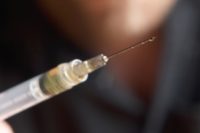Puncture: Hollywood movie highlights sharps-related injury risk

 Writers on the National Institute for Occupational Safety and Health (NIOSH) Science Blog are using a movie release as an opportunity to remind the health care industry about NIOSH's Stop Sticks Campaign.
Writers on the National Institute for Occupational Safety and Health (NIOSH) Science Blog are using a movie release as an opportunity to remind the health care industry about NIOSH's Stop Sticks Campaign.
The film, "Puncture," is based on the true story of a nurse who contracts AIDS after an accidental stick. She contacts two personal injury lawyers, played by Chris Evans (of Captain America) and Mark Kassen, who base their case around a safety device that could have prevented the nurse's injury.
The scenario in the film, say blog post writers Thomas Cunningham, PhD, and Garrett Burnett, MS, MBA, occurs about 385,000 times a year -- mostly among nurses. These victims run a 1.8% chance of developing a bloodborne infection.
Cunningham is a behavioral scientist and Burnett a health communications fellow in the NIOSH Education and Information Division.
"While the numbers are appalling, the most harrowing costs emerge in the stories of the individuals affected," say Cunningham and Burnett, who hope that "Puncture" will the "shot in the arm" needed to draw attention to the problem.
"The Stop Sticks Campaign devised by NIOSH is a community-based information and education program aimed at raising awareness about the risk of exposure to bloodborne pathogens such as HIV, hepatitis B, and hepatitis C from needlesticks and other sharps-related injuries. The target audience includes clinical and nonclinical health care workers and health care administrators in hospitals, doctor's offices, nursing homes, and home health care agencies."
The campaign is intended to influence the safety cultures of organizations and promoting consistent use of safer sharps devices and practices.
"We designed the Stop Sticks Campaign materials to prepare and motivate health care workers and administrators to make the changes needed to reduce sharps injuries within their organizations."
According to an unofficial site about "Puncture" (www.puncturemovie.com) a revolutionary device invented in the 1990s to prevent accidental needlesticks was blocked from widespread use due to "a corrupt arrangement between monolithic hospital purchasing cartels and a big needle maker, in which the industry giant was able to pay millions in kickbacks to the cartels to make sure its unsafe products -- and only its products were used in hospitals." The site says the "cartels" referred to are hospital group purchasing organizations, or GPOs, and that the case brought by the two lawyers on behalf of the nurse was eventually settled out of court for $150 million.
Looking for a reprint of this article?
From high-res PDFs to custom plaques, order your copy today!







